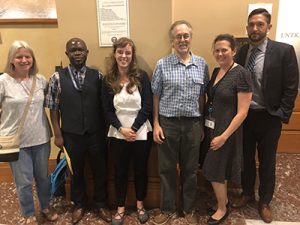Note: This guest blog was written by Amanda Ulrich, with assistance from members of Portland’s Never Again Coalition.

L-R: Kathy Cordell, Eugene Sadiki, Amanda Ulrich, Marty Former, Stacey Foreman (Portland’s Sustainable Procurement Coordinator), and Lester Spitler (Portland’s Chief Procurement Officer)
On Wednesday, August 22, 2018, the City Council of Portland unanimously passed a new Sustainable Procurement Policy, which both incorporated and improved the Conflict Mineral Free Resolution passed on August 26, 2015. Congolese leader, Eugene Sadiki and I testified in support of the resolution. Leading up to the council vote several local groups, businesses and activists submitted letters of support including the Never Again Coalition, Amnesty International, Oregon Coalition for Humanity and Thomas, Coon, Newton & Frost, to list a few.
In the months leading up to the August 22nd council meeting, as a liaison for area stakeholder groups, I worked directly with the Sustainable Procurement Coordinator, Stacey Foreman, to offer feedback on the new Sustainable Procurement policy, specifically regarding Conflict Minerals. The City of Portland Procurement Services department supports every bureau in the city, so their sustainable practices and guidelines have a far reach within the entire city, which amplifies the impact of its policies. The new sustainable procurement policy (Resolution Number 37379) is more robust and shifts the implementation of the Conflict Minerals components from a reliance upon federal legislation to using international guidelines set out by the Organisation for Economic Co-operation and Development (OECD), specifically their Due Diligence Guidance for Responsible Supply Chains of Minerals from Conflict-Affected and High-Risk Areas. As I pointed out in my testimony, this shift is significant and important in that federal legislation is more at risk of being overturned, whereas the OECD guidelines are recognized internationally and already followed by industry.
Eugene Sadiki is a leader of the Congolese community in Portland, Oregon. Eugene is from eastern Congo, and has witnessed first hand the violence in his country caused by infighting over who controls the mineral wealth. His testimony was pivotal in terms of offering a personal perspective on not only conflict minerals, but how policy can impact lives on the ground. We are proud to have him working with us on this important issue.
In tandem with the city’s new resolution, Lauren Fortgang (Policy Director at the Never Again Coalition) and Marty Fromer (Oregon Area Coordinator, Amnesty Int’l USA) have been working with State of Oregon legislators to introduce a conflict mineral free bill in the 2019 Legislative session addressing State of Oregon procurement policy. Later this month they, with other area activists, will meet with representatives in the state capitol during Legislative Days to garner support in the coming legislative session.
In the coming months we will be working with the City of Portland’s Office of Government Relations to place on their 2019 legislative agenda advocacy for a State of Oregon Procurement Policy with regard to conflict minerals. The Office of Government Relations is the City’s liaison at the State capitol to advocate for policies which further strengthen the objectives and values of the City of Portland’s already existing policies. Most cities in Oregon use purchasing contracts that go through the state which mean that a State of Oregon conflict mineral free procurement policy would not only further strengthen and amplify the City of Portland’s ethical purchasing, but also those of every city in the state.
We are all thankful for the City of Portland’s continued commitment to sustainable purchasing, which directly impacts human lives, and look forward to expanding the impact through our state level work in the coming 2019 legislative session.
Watch Ms. Ulrich’s testimony (starting at 53:09) and Mr. Sadiki’s testimony (starting at 1:06:39) below.

